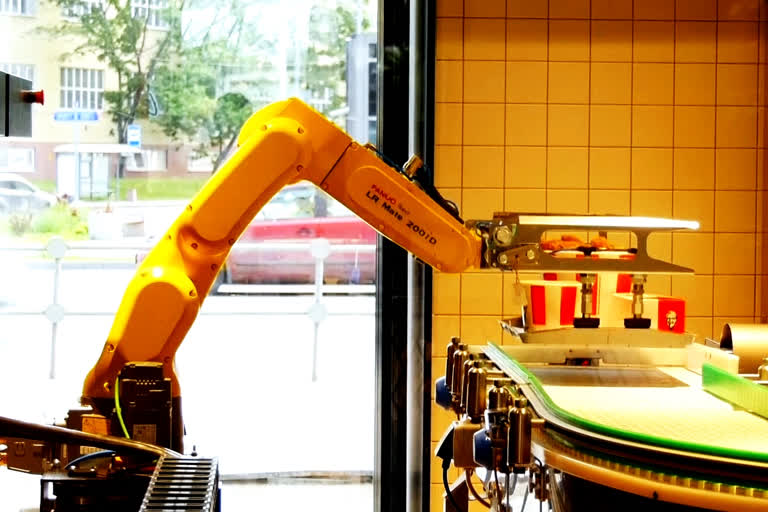Moscow: The Colonel's recipe served by robotic arms.
Fast-food chain KFC has opened its first restaurant with a fully automated food collection system in Moscow.
A specially designed robotic arm picks up orders from a conveyer belt, and places them into a collection point, where customers can collect their orders.
The automated system uses facial recognition.
Read also: World's 'First robot citizen' in India; talks about climate change, energy conservation
When a customer places their order, a camera collects their biometric data. Then, at the food collection point, the system reads their face and the order is delivered to the right customer point.
"This is a modern type of restaurant, which we opened as an incubator for ideas, innovation, technological idea," explains Dmitry Ageev, director for innovation information technologies.
"So, it is a kind of our experiment about how we see digital future, about how restaurants should work, and how they should interact with our customers, our guests."
The automated delivery system works with self-service kiosks, already common in fast-food restaurants.
The order is placed without a salesperson, thus making the whole process, including payment - with cash or card - automated. Of course, food is still prepared by humans.
Read also: Hello and welcome: Robot waiters to the rescue amid virus in Netherlands
The fast-food chain says the automated system only stores biometric data for the duration of the order unless customers want to participate in a loyalty program, which will remember your biometric data and display special offers on future visits.
Ageev claims the technology significantly increases productivity and service speed.
"In this restaurant, we are tackling the problem of customers' service speed and increasing the capacity (of the restaurant). Such type of restaurant is several times more efficient than the usual one," he says.
PR director Irina Gushchina says the chain has been working on the technology for years, long before the coronavirus outbreak.
But it has become more useful now, particularly for customers observing social distancing.
"We can now offer a solution that is optimal for the guests in the current situation, a restaurant where contacts are minimised, and where safety is ensured perhaps more than in any other restaurant," she says.
Gushchina claims the technology is a response to customer's demands.
People want more independence, faster food and more options during the ordering process, she says.
"If you look at any industry, any market sector, you will see that these processes of digitalization are going on," she says.
"It would be strange if they wouldn't take place in the foodservice sector."
But could technology also threaten takeaway workers' jobs?
No, says Gushchina. She says the number of restaurant employees will not change, but their roles will. People are needed to service the new systems, for instance.
"As experience shows, the introduction of innovations changes the type of jobs, the type of tasks that a staff member should deal with," she says.
Food industry analysts say the coronavirus pandemic did not only affect the sector in terms of sales, but also caused a so-called "crisis of trust".
It's creative ideas like this that may help it overcome this crisis.
"It is not clear when people will begin to trust again, when they will come back and will be comfortable sitting at tables, as we do now, next to other people – there is a big question mark over it," says Marina Lapenkova, director for development at market research firm NPD.
"So, I think the initiative can bring results."
Lapenkova says fast food chains are weathering the coronavirus crisis better than others, due to delivery patterns like takeaway or drive thru.
"This crisis also gave an opportunity for the fast food restaurants to increase their market share," she says.
The Moscow restaurant is the first KFC outlet with automated food delivery anywhere in the world.
It's expected to serve as a kind of testing ground and experimental lab for new technologies, before introduction in other restaurants.
There are over 23,000 KFC restaurants in more than 135 countries worldwide.
AP



